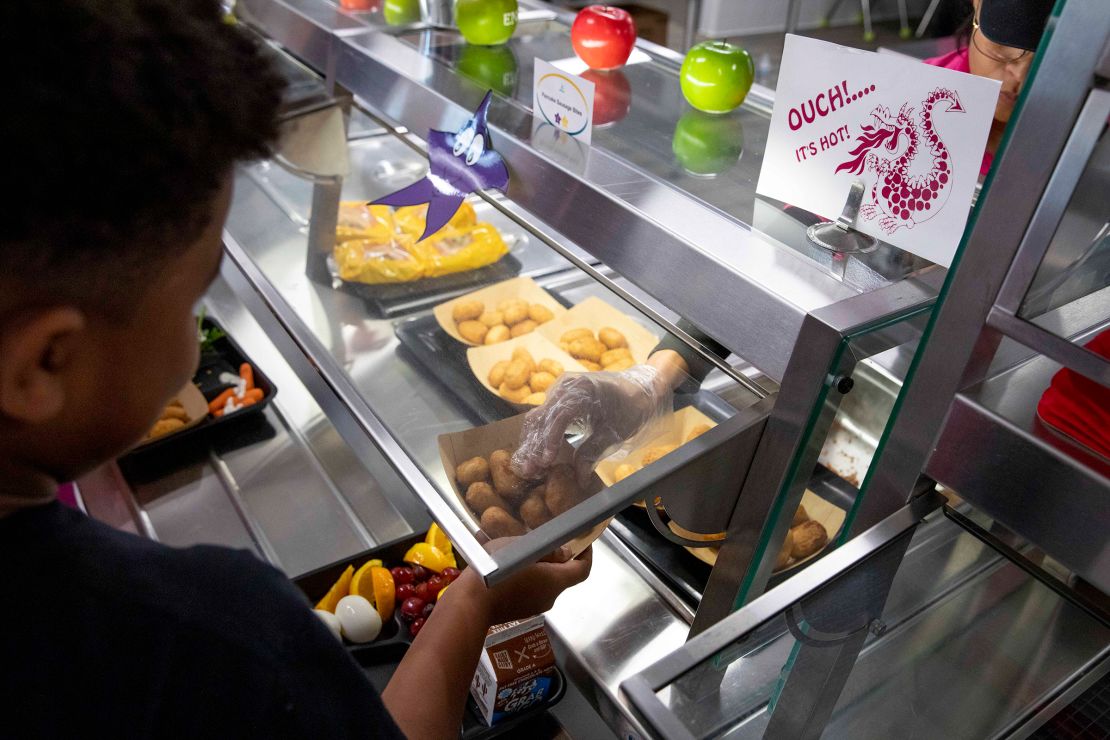CNN
—
Steak ‘n Shake, a chain best known for milkshakes paired with burgers, is not exactly the first food that comes to mind that would comport to the tenets of wellness championed by the “Make America Healthy Again,” or MAHA movement.
MAHA supporters, led by Health and Human Services Secretary Robert F. Kennedy Jr., agitate for “clean” ingredients, cutting out sugar and saying no to food dyes and seed oils, among other things.
Yet Steak ‘n Shake has managed to earn the health secretary’s blessing after announcing it would shift to using beef tallow — a MAHA favorite — to fry its food. This spring, it even mounted at least one pop-up lunch day at HHS headquarters, according to signs seen by CNN in the building.
Major food and agricultural groups are publicly positioning themselves as fans of the MAHA movement, with brands of all stripes rushing to seize this moment for change as Kennedy draws up plans to reshape American food policy.
By August, the secretary aims to issue the second installment of a sweeping plan, ordered by President Donald Trump, to tackle the causes of chronic illnesses in the country. The first report laid the groundwork for Kennedy’s targets: environmental toxins, certain medications and a whole lot of processed food. This second stage will lay out what HHS and other agencies plan to do about it.
On top of that, Kennedy has also pledged new, slimmed-down dietary guidelines in line with this vision, also due out this summer — another change for food companies to furrow their brows over.
But even as food and consumer advocates and their lobbyists jockey for a say, access and results have been highly mixed. Some are girding themselves for chilly receptions.
“I’m not going to say that there’s no opportunity,” one consumer advocacy group executive, who asked not to be named amid the sensitive discussions, put it.
But the secretary “has been out there on a lot of unproven theories over the years,” the person said, “and we’re skeptical that our views will be taken seriously.”
Food and agricultural groups were already put on guard when Trump issued an executive order in February demanding a new approach to health in America.
The order established the “MAHA Commission,” which would advise the president on “how best to exercise his authority to address the childhood chronic disease crisis.” In his capacity as HHS secretary, Kennedy was tapped to lead it and pulled together its first report laying out the main culprits, in the commission’s estimation, driving chronic diseases in the country.
The specter of industry crackdowns that the report promised to bring set off a flurry of efforts to court Kennedy and his MAHA allies.

As Kennedy was preparing the report, the National Oilseed Processors Association and the Edible Oil Producers Association, representatives of seed-oil makers, each hired new lobbyists.
The American Beverage Association, the trade group for major brands like Coca-Cola and PepsiCo, spent over $1 million in Washington, DC, lobbying the first few months of this year, up from $710,000 in the same period of 2024 according to public filings compiled by CNN.
But it seems these overtures have so far only had limited success. This month, oilseed processors wrote a letter to Kennedy complaining that they, along with soybean and corn farmers, ranchers and other farming groups, have had no dialogue with HHS about the first MAHA report, which they argued had many flaws — or about what could come in the next installment.
The lack of traction is, perhaps, unsurprising. Kennedy has railed against perceived influence that industry groups have over the agencies that regulate their products. The initial MAHA report specifically called out government lobbying across various industries, noting that more than 60% of lobbyists were formerly federal employees.
Other major brands have gone the route of publicly stepping up the message of their alignment with the MAHA movement.
Of its beef tallow switch, Steak ‘n Shake said in February that its fries were being “RFK’d!” The fast-food chain states on its website that fries, onion rings and chicken tenders are now fried in 100% beef tallow but other changes, like altering bread bun recipes to remove seed oils, will take more time.
Last week Kraft Heinz, one of the country’s biggest food manufacturers, said it would begin to phase out artificial food dyes in popular products like Heinz Ketchup, Crystal Light, Jell-O and Kool-Aid. “It is in our DNA to continuously renovate and innovate to make sure that we stay relevant and bring value to our consumers,” a Kraft Heinz spokesperson told CNN.
And when Starbucks CEO Brian Niccol met with Kennedy this month, he shared, as the secretary put it, the coffee chain’s plan to “further MAHA its menu.”
Regarding this, a Starbucks spokesperson told CNN it aims to let customers make “informed nutritional decisions with transparency on ingredients, calories, and more. Plus, we keep it real — no high fructose corn syrup, artificial dyes, flavors, or artificial trans-fats.”
The voluntary moves to align with MAHA goals seem to have at least earned those brands public praise from Kennedy.
Brewing alongside this is a separate longtime Kennedy priority: changing the nation’s dietary guidelines.
The federal guide, which runs 164 pages, is used by everything from schools to doctors’ offices to determine what students eat, what patients are recommended and what can be bought on food stamps.

Kennedy has repeatedly said he wants the document to be chopped down to “four page(s)” of plain language that is easy for parents, nurses and schools to use and that the update will also be delivered this summer.
The current guide, Kennedy told reporters in April, “looks like it was written by the food processing industry.”
Yet it’s not all up to Kennedy. The dietary guidelines are a joint project between HHS and the US Department of Agriculture, which also oversees vast parts of America’s food systems and nutrition programs.
The jurisdictions of the two agencies is not straightforward and can be at times downright confusing.
For example, the Food and Drug Administration, or FDA, a part of HHS, regulates health standards for sandwiches, but the USDA oversees the standards for open-face meat sandwiches.
FDA oversees meat products made from bison, antelope, squirrels, opossums, rabbits and an array of wild poultry, but USDA has control over farm and factory-raised ducks, geese, chicken and other domestic poultry.
Wild duck and geese food safety, on the other hand, are still managed by the FDA.
USDA oversees most livestock meat products while the FDA regulates fish — except catfish. That fish moved over to USDA’s purview in 2016, after domestic catfish farmers lobbied Congress for more safety oversight.
Importantly, USDA is also in charge of the Supplemental Nutrition Assistance Program, or SNAP, which provides food stamps to low-income Americans.
Kennedy has campaigned for barring Americans from using food stamps to buy soda and candy, triggering backlash from industry groups including the American Beverage Association — which pointed out SNAP isn’t part of the HHS secretary’s job.

All this would make the situation seem ripe for conflict.
The health and agriculture agencies “have a huge overlap,” but previous clashes have usually been about food-safety issues, said Marion Nestle, a New York University professor emerita and author of the book “Food Politics.”
“It’s never been a problem before, because nobody’s ever tried to do anything like this before,” she said, referring to the large-scale reforms Kennedy is proposing.
Amid these overlapping factors and interests, some lobbyists think they can find better luck with the USDA and its secretary, Brooke Rollins, according to people familiar with discussions.
She has already sought to reassure farmers and food manufacturers who objected to the first MAHA report that its finding were not final.
“There’s no doubt that we could do better on the next report, and my commitment is to do everything I can to ensure that our ‘Ag’ community is better represented,” Rollins told the House Agriculture Committee this month.
Rollins, a longtime Trump ally who grew up on a Texas farm, is “savvy” when it comes to navigating Kennedy’s MAHA goals, said one person familiar with the discussions. “She’s not gonna let somebody roll her over if she really cares about it.”
CNN has reached out to HHS and the USDA for comment.

